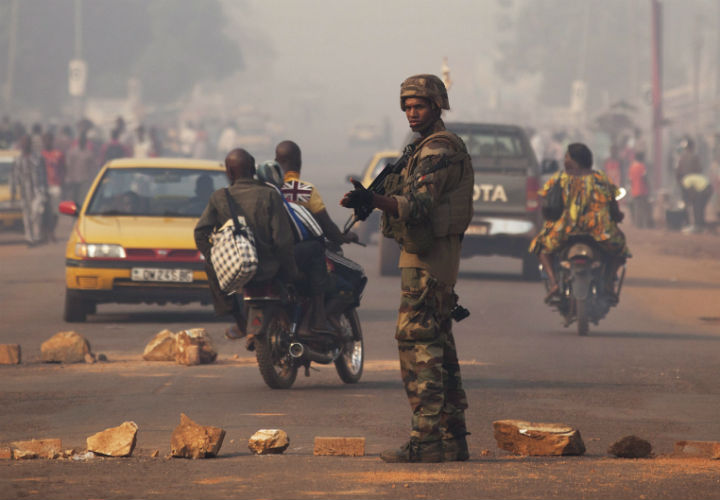DAKAR, Senegal – The embattled president of Central African Republic, who has come under growing pressure to resign, travelled to neighbouring Chad on Wednesday for a summit with regional leaders who want to end the bloodshed that has left more than 1,000 people dead.

Michel Djotodia, a former rebel leader who was thrust into the presidency after his fighters overtook the capital about 10 months ago, has been widely criticized for failing to stop the inter-communal violence that exploded last month. Wednesday’s trip marks the first time he has left the volatile country since an attempted coup in early December. An armed movement of Christian fighters was behind that attack, and they have vowed to continue their battle until Djotodia steps down from power.
READ MORE: 1000s of displaced people block runway in Central African Republic capital
France’s foreign minister said leaders from other states in Central Africa will this week discuss whether Djotodia should stay on as interim president.
“It is expected that the countries of the region will meet Thursday for an update and to make decisions,” Laurent Fabius told Le Parisien newspaper, according to a transcript.
Djotodia’s spokesman, Guy Simplice Kodegue denied talk that the interim leader would step aside.
Djotodia is the first Muslim president of a predominantly Christian country, and is accused of solidifying his hold on power with the help of mercenary fighters from Chad and Sudan. His men – collectively known as Seleka – are accused of committing scores of atrocities against civilians since they seized power in March 2013. Anger over the deteriorating situation has sparked waves of inter-communal violence.
READ MORE: CAR crisis may not be next Rwanda, but still needs response: Dallaire
Armed Christian militias who oppose Djotodia’s leadership also have been accused of committing human rights abuses against Central African Republic’s minority Muslim population in retaliation, beating and stoning to death suspected former members of Seleka in the streets of the capital.
Religious leaders and the international community have appealed for peace, and thousands of French troops and regional peacekeepers are trying to temper the mob violence. Tensions remain high, though, and nearly 1 million people – including more than 500,000 people in the capital alone – have fled their homes as a result.
WATCH: The regional director for the UN World Food Programme in West Africa on Thursday said the “entire humanitarian community” was working together to deliver aid to displaced persons who have sought refuge at Bangui international airport
Djotodia hails from the far north of Central African Republic where he was a leader of the UFDR, one of several rebel groups that joined forces in December 2012 with the objective of ousting longtime President Francois Bozize from power. After taking charge of the country, though, it became clear that Djotodia wielded little control over the rag-tag group of fighters who paraded through the capital in stolen vehicles armed with rocket-propelled grenades.
As international criticism grew over their abuses, Djotodia sought to distance himself by formally disbanding the alliance of rebel groups. Internal divisions also have emerged within the senior leadership, and Djotodia has fired several of his former top allies in a series of political cabinet shake-ups in recent months.
READ MORE: 6 Chadian soldiers killed in Central African Republic attack
In late December, assailants tried to attack Djotodia’s private residence and the presidential palace but were repelled by his fighters.
Djotodia has agreed to hold elections by the end of the year, according to Prime Minister Nicolas Tiangaye, a longtime opposition leader during the Bozize era. The American ambassador to the United Nations has urged the interim government to step aside following the vote.
“It is extremely important that the president, the prime minister and the head of the council have all agreed to relinquish power as soon as elections occur,” Samantha Power said during her visit to Bangui last month.



Comments